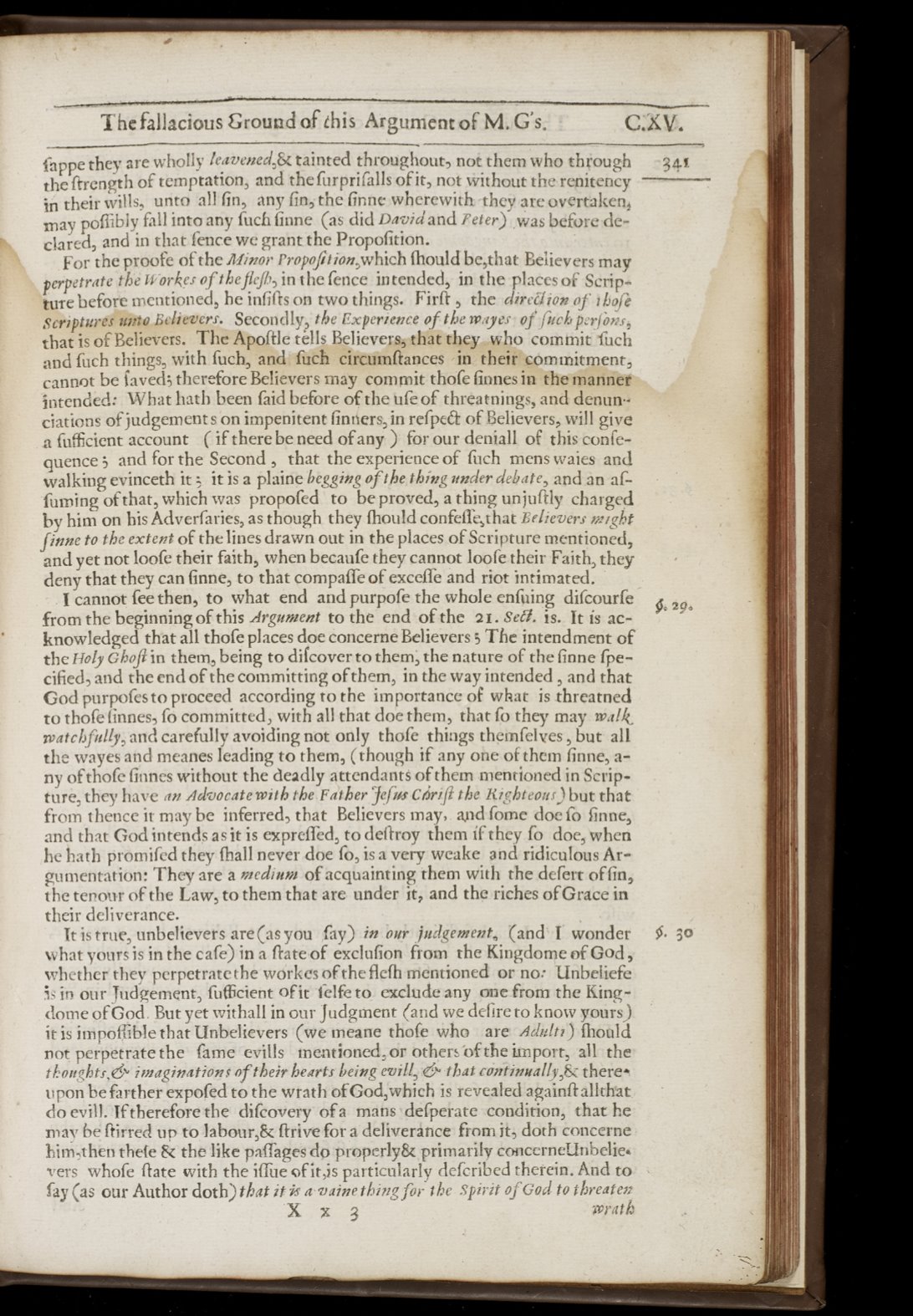

The
fallacious
&round
of
this Argument
of
M.
G's.
C.XV.
fappe they are
wholly leavened,&
tainted throughout, notthem
who
through
341
the
ftrength
of
temptation, and
thefurpriCalls
of
it, not without the renitency
in
their
wills,
unto
all
fin,
any
fn,
the
fir=
wherewith
they
are overtaken,
may
poffibly fall
into
any fach finne (as
did Davidand
Peter)
.was
before
de-
clared,
and
in
that
fence
we
grant the
Propofition.
For the proofe
of
the
Minor
Propofition,which
fhould
be,that
Believers
may
perpetrate the ttiorkes
of
the
flefh,
in
the
fence
intended,
in
the
places
of
Scrip
-
ture before mentioned, he
infifts
on
two
things.
Firft
,
the diredion
of
thofe
Scriptures unto Believers.
Secondly,
the
Experience
of
the
wages
of
fuck perfons;
that
is
of
Believers.
The
Apoftle tells Believers;
that
they
who
commit fuch
and
fuch
things, with fuch, and fuch circumftances
in
their commitment,
cannot be laved; therefore
Believers
may commit thofe
finnes in
the mannet
intended:
What
bath
been
Paid
before
of
the
ufe
of
threatnings, and
denun-
dations
of
judgements
"on
impenitent linnets,
in
refpeët
of
Believers, will give
a
fufficient
account
( if
there
be need
of
any
)
for
our
denial!
of
this conic
-
quence;
and
for
the
Second
,
that
the
experience
of
fuch
mens wales
and
walking
evinceth
it ;
it
is
a
plaine
begging
of
the,thing under debate,
and
an
af-
fuming
of that,
which was
propofed to be proved,
a
thing unjuftly charged
by
him on
his
Adverfaries,
as
though they fhould confefte,that
Believers
might
finne
to
the
extent
of
the
lines
drawn out
in
the
places
of
Scripture mentioned,
and yet not
loofe
their
faith,
when becaufe
they cannot loofe.their Faith, they
deny
that
they
can finne,
to
that
compaife
of
exceffe
and
riot intimated.
I
cannot
fee
then, to
what end and purpofe the whole
enfuing difcourfe
.296
from the
beginning
of
this
Argument
to the
end
of
the
21.
Sea.
is.
It
is
ac-
knowledged
that
all thofe
places
doe concerne
Believers
5
The
intendment
of
the
Holy
Ghofl
in
them, being
to
difcover
to
them;
the
nature
of
the
finne
fpe-
cified, and
the end
of
the committingofthem,
in
the
way
intended
,
and
that
God
purpofes
to
proceed according
to
the importance of what
is
threatned
to
thofe
fumes, fo
committed,
with
all
that
doe them,
that
fo
they
may wall¿
watchfully, and carefully
avoiding
not
only thofe things
theinfelves, but all
the
wayes
and meaner leading
to
them, (though
if
any
one
of
them
finne,
a-
ny
of
thofe
füines
without the deadly attendants
of
them mentioned
in
Scrip-
ture,
they have
an
Advocate
with
the
Father jefus
Cdri/f the
Isighteou.$)
but
that
from thence
it may
be inferred,
that
Believers may,
and fome doe
fo
finn;
and that God intends
as
it
is
exprefted,
to
deftroy them
if
they
fo
doe, when
he
bath
promifed they
fhall
never
doe
fo,
is
a
very weake and ridiculous Ar-
gumentation:
They
are
a
medium
of
acquainting them
with
the defert
of
fin,
the tenour
of
the Law,
to
them
that
are under
it,
and the
riches
of
Grace in
their deliverance.
It
is
true, unbelievers are (as
you
;fay)
in
our
judgement,
(and
I
wonder
4.
30
what
yours
is
in
the cafe)
in
a
ftate
of
exclufion from
the
Kingdome
ofGod,
whether
they perpetrate the workes
of
the
flefh
mentioned or no: UnbeIiefe
is
in
our Judgement,
fufficient
of
it
felfe
to
exclude
any
one from
the
King
-
dome
of
God.
But
yet
withal!
in
our Judgment (and
we
delire to know
yours)
it
is
impofiible
that
Unbelievers
(we
meane thofe who
are
Adulti) fhould
not perpetrate the
fame
evills
mentioned,
or
others
óf
the import,
all
the
thoughts,& imaginations
of
their
hearts
being evil!,
2:°
that
continually,&
there-
upon be
farther
expofed
to the
wrath ofGod,which
is
revealed
againftallthat
do
evil!.
Iftherefore the difcovery
of
a
mans
delperate condition,
that
he
may
be
flirted
up
to
labour,&
ftrive for
a
deliverance from
it,
doth concerne
him
,then thete
8t
the
like
paffages
do properly&primarily
concerneUnbelie.
vers
whole Rate with
the
iffue
of
it,is
particularly defcribed therein.
And
to
fay
(as
our Author Both) that
it
is
a
vaine thing
for
the Spirit
of
God
to
threaten
x
3
wrath










